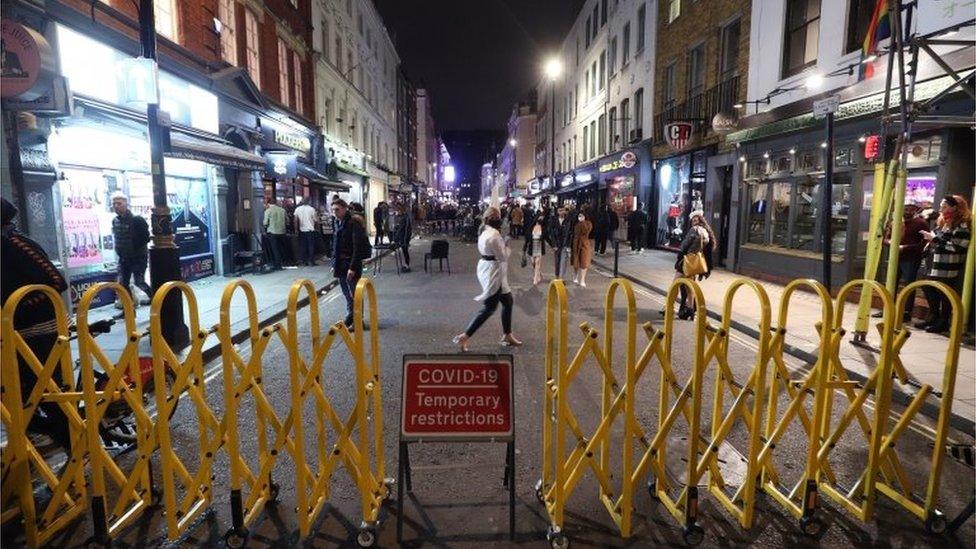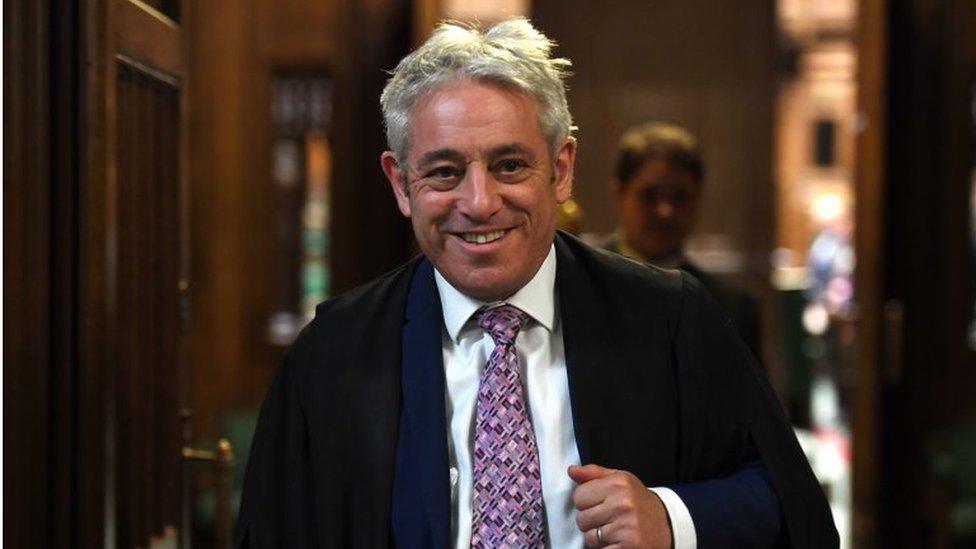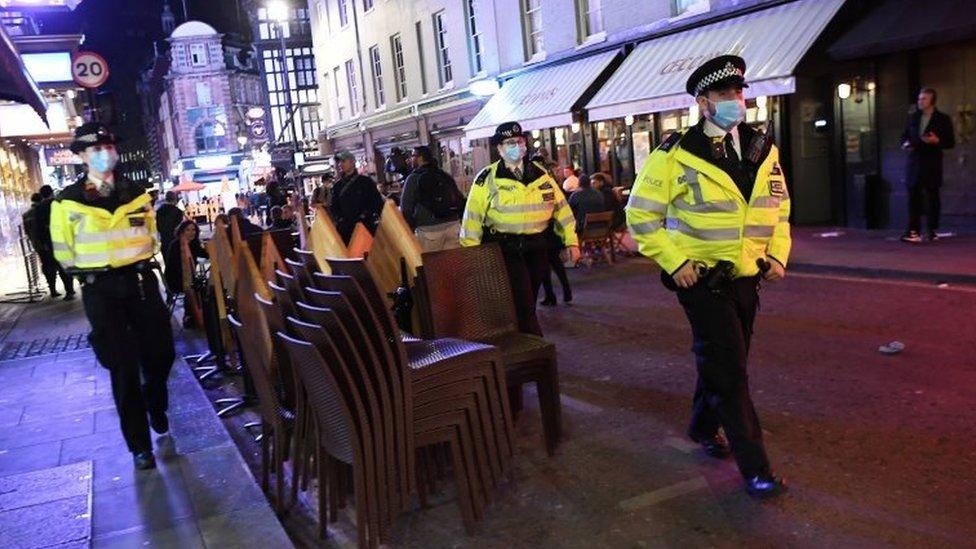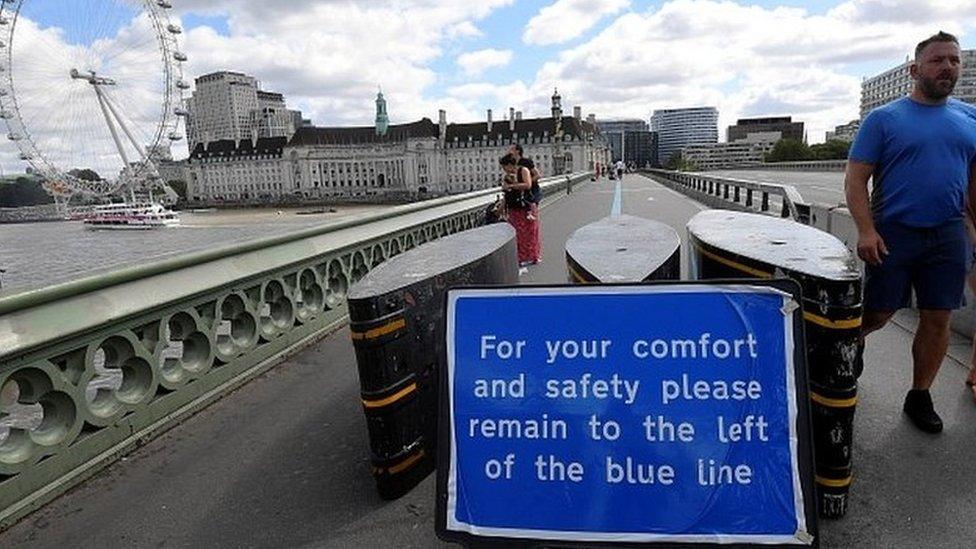Coronavirus: Support grows for rebel MPs over law
- Published
- comments

Labour is "very sympathetic" to a bid by Conservative MPs to increase parliamentary scrutiny over coronavirus restrictions in England, shadow justice secretary David Lammy has said.
Tory Sir Graham Brady wants MPs to have a say on changes to lockdown rules.
Ex-Commons Speaker John Bercow and Steve Baker, a former Brexit minister, have also spoken in favour of the move.
The government says it wants to work with MPs while ensuring ministers can react quickly to suppress the virus.
It has also said MPs will get the chance to vote retrospectively on the 'rule of six', which puts a limit on the number of people at social gatherings.
Mr Lammy told the BBC's Andrew Marr he was "very sympathetic" to the amendment.
"We need more transparency... and we should be debating the regulations and rules for the country," he said.
However he avoided committing support to Sir Graham, pointing out that Labour would table its own amendment and would wait and see if it was selected by Commons Speaker Sir Lindsay Hoyle this week.
In March, Parliament passed the Coronavirus Act. It gave the government powers to respond to the pandemic, including moves such as postponing local elections, closing down pubs and allowing courts to use live links.
The powers granted by the act were time-limited and can only be extended with the House of Commons' approval.
MPs will be asked to renew the powers on Wednesday but several have expressed concern and Sir Graham has tabled an amendment that would give Parliament a say over new national restrictions before they are brought into force.
Speaking to Sky News' Sophy Ridge on Sunday programme Conservative MP and former Brexit Minister Mr Baker said: "How do people think that liberty dies? It dies like this with government exercising draconian powers, without parliamentary scrutiny in advance, undermining the rule of law by having a shifting blanket of rules that no-one can understand."
BBC parliamentary correspondent Mark D'arcy says the initial steer is that it is unlikely the Speaker would select Sir Graham's amendment, meaning it would not be put to a vote.
But, he says, the Speaker does consider the breadth of support for an amendment, including its level of cross-party appeal, so support from Labour figures would influence his decision.
Sir Graham, who is chairman of the 1922 Committee of Conservative backbenchers, has support from a wide spectrum of MPs including 50 other Conservatives, an ex-party leader Sir Iain Duncan Smith and former-Labour deputy leader Harriet Harman.
The DUP also supports the move, while the SNP is said to be considering it.
The amendment also has support from Mr Bercow, former Speaker of the House of Commons.

Speaking to The World This Weekend on BBC Radio 4, he said the House of Commons had initially been prepared to "cut the government some slack" given the circumstances.
But, he said, since then 50 laws with potential and actual criminal sanctions had come into force, without Parliament having a say.
"That cannot continue if we are to call ourselves a democracy," he said.
Liberal Democrat leader Sir Ed Davey said he would "almost certainly" vote for the amendment and accused the government of failing to come to Parliament "when it should have done".
However he added that the amendment "did not go far enough" arguing that the original Coronavirus Act "failed people".
Specifically he pointed to a clause in the law which took away parts of councils' duty to provide care for disabled people.
"For the government to legislate to take away peoples' rights to care I think is outrageous," he said.
The government has said it is "determined to take the right steps to protect" those who are most vulnerable to the disease and that the care provisions implemented in the Coronavirus Act are only intended to be used when absolutely necessary.


The numbers don't look good for Downing Street.
Forty-plus Conservative MPs, combined with opposition parties, is enough to overturn Boris Johnson's majority.
And there are now easily enough Tories behind the Brady amendment - while opposition groups are making some supportive sounds, albeit at various volumes.
However, a big question mark hangs over this particular political showdown; namely whether the amendment will even be selected by the Speaker.
But even if this amendment falls, the grievance doesn't.
It's not hard to find an unhappy Tory MP wandering around Westminster at the moment.
Some think that the dial has moved too far back towards restricting people's liberty.
Or that parliament is being all-too-often ignored by ministers; even eroded as a democratic institution.
There's a view too that policies might emerge in better shape if they were stress-tested by the Commons.
A counter argument is that - in an emergency - ministers don't want to hang about waiting for Parliament's permission to act.
No. 10 knows it's facing trouble and has been trying to stress that it's engaging with MPs.
But some of those MPs are past the point of being "engaged" with. They want a real say.

- Published25 September 2020

- Published25 September 2020
- Published21 September 2020
